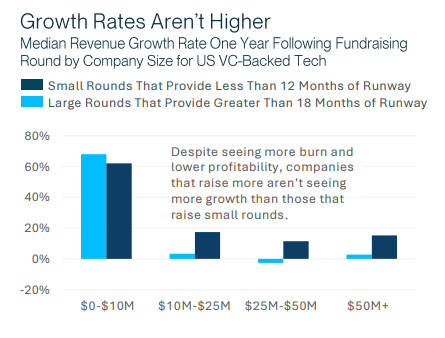
Gritty Startups and AI’s Billion-dollar Bets
Plus: How to build a viral brand with AI
Sponsored By: Superfilter
This essay is brought to you by Superfilter, the YC-backed AI assistant that manages your email like an executive assistant. Superfilter helps you stay on top of important emails, keeping your inbox organized and handling repetitive tasks like meeting coordination—and so much more.
Superfilter pairs with your existing email client and learns from your habits to organize your inbox effortlessly. Once trained, it starts taking things off your plate, so you can focus on what truly matters. Hire Superfilter to handle your inbox today.
Hello, and happy Sunday! In anticipation of back-to-school season, we’ve been prepping for our new course, How to Write With AI, that Evan Armstrong will be teaching starting on September 19. Our cohort of nearly 60 students includes executives from companies like Netflix, Midjourney, and leading AI startups. There’s still time to enroll, so check out the course website for more information. In the meantime, read on for everything we published last week and our take on the latest tech news.—Kate Lee
Was this newsletter forwarded to you? Sign up to get it in your inbox.
Knowledge base
🔏 "Welcome to the Era of the Gritty Startup" by Evan Armstrong/Napkin Math: The age of gluttonous startups is over, and we're entering the era of grit. With venture capital funding drying up and growth slowing, it's time for a new breed of startups. Evan outlines three lessons from the past (hint: stock-based compensation isn't free money) and paints a picture of the future: smaller teams, bigger visions, and a focus on cash flow. Read this if you want to build a startup that can thrive in leaner times.
"OpenAI's New Model, Strawberry, Explained" by Dan Shipper/Chain of Thought: ChatGPT is famous for being unable to count the "r"s in "strawberry." OpenAI's latest model, Strawberry, might just solve that conundrum. It's trained on step-by-step reasoning, potentially making it smarter than your average AI bear. Read this if you want to understand why your next chat with ChatGPT might feel more like talking to a math whiz than a lucky guesser.
"Benevolent Billionaire or Despot—Or Both?" by Evan Armstrong/Napkin Math: Properly judging Bill Gates entails balancing his Jeffrey Epstein connections with his saving millions of lives with his philanthropy—the moral math gets complicated, fast. Evan reviews a new book that attempts to profile Gates. Read this for a thought-provoking look at the ethics of extreme wealth and why billionaires might represent a kind of moral singularity beyond our usual frameworks.
🎧 “The Browser Company Is Building a Brand That Drives Viral Growth" by Dan Shipper/Chain of Thought: The Browser Company's head of storytelling, Nashilu Mouen-Makoua, reveals how she’s using AI to build a brand that doesn’t feel like a brand with the Arc browser. From hosting keynotes in diners to using ChatGPT for research, Nash shares her playbook for creating authentic narratives that resonate beyond Silicon Valley. 🎧 Watch on X or YouTube, or listen on Spotify or Apple Podcasts. Subscribers have access to the full transcript.
🔏 "Inside the Pod: Can AI Solve the Adult Friendship Problem?" by Rhea Purohit/Chain of Thought: If you’ve been feeling lonely, AI may be able to help. New York Times columnist Kevin Roose made 18 new friends—with AI companions. His experiment reveals the potential and pitfalls of digital friendships, whether getting parenting advice or fit checks. Read this for a glimpse into the future of social connections and to learn how a tech expert uses AI in his daily life and work.
Fine tuning
Alexa will soon cease to suck. Reuters reported that Amazon would be swapping some of its home-grown large language models with those developed by Anthropic. Amazon is planning to offer a subscription service for $5-10 a month because Claude “performed better than the online retail giant's own AI models.” Big company slowness loses to focused startup effort once again. I don’t know why anyone would pay for this, but tens of millions of Alexa devices have been sold—surely some will convert.
OpenAI enjoying a fat multiple. OpenAI is reported to be raising a new round at a $100 billion valuation. With its annualized revenue (current month’s revenue multiplied by 12) sitting at $3.4 billion, you’re looking at a 29.4 current revenue multiple. The unknown detailshere—gross margin, growth, research pipeline, etc.— really matter, but this valuation and bet would make it one of the most valuable startups in the world. Apple, Microsoft, and Nvidia are in talks to participate with Thrive Capital leading the round.
A new language model can ingest 750 books at once. Magic—a startup building artificial general intelligence (AGI) with an LLM focused on coding—announced that its new model has a context window of 100 million tokens. For context (heh), most leading models have a context window of something like 2 million. To accompany this research achievement, the company has raised $320 million in capital. Not bad for a team of 23 people! I’m still thinking about what you can do with 100 million tokens versus our current paradigm of a million tokens plus searching techniques like RAG. If you’re building something that is only possible with this amount of tokens, reach out.
Nvidia’s future is still unclear, despite stellar results. Its data center segment grew revenue to $26.3 billion—2.5 times more than what the business generated last year. Nvidia’s overall top and bottom lines beat Wall Street’s targets. Yet the stock is down about 7 percent for the week. Why? It’s unclear how long this streak continues.
The macro question in AI is this: Where the hell is the revenue? On the quarterly earnings call, after an analyst asked what kind of return on investment Nvidia’s customers were seeing on their chip purchases, CEO Jensen Huang replied, “The people who are investing in Nvidia infrastructure are getting returns on it right away. It's the best ROI infrastructure, computing infrastructure investment you can make today. And so, one way to think through it, probably the most—the easiest way to think through it is just go back to first principles.”
My rule of thumb is that anytime a CEO says “first principles,” they’re punting the question. That is the case here. Obviously every big tech company is purchasing Nvidia’s GPUs in the pursuit of frontier models. What’s nice is that these chips can switch back to other machine learning use cases (like ad targeting for Meta or inference for AWS) after the frontier model is trained, but those use cases only materialize if LLMs keep getting better. The prize of AGI is so compelling that I would expect this level of spend to continue, but still, this is not exactly a reassuring line of logic for Wall Street.—Evan Armstrong
Data mining
Mo’ money…less growth? Startups that raised less money grew revenue more quickly:
Source: Silicon Valley Bank.
Other than the smallest startups, companies that raised less than 12 months of runway generally experienced substantially more revenue growth than those raising more than 18 months’ worth. It’s impossible to infer too much from a few bars on a chart, but one implication is that less is, in fact, more, when it comes to funding. Why might that be? Because if you have 12 months of runway (or less), then you have neither the time nor the money to be complacent. Getting a little gritty might just be the key to survival.—Moses Sternstein
Alignment
The prestige. Anu Atluru's essay on “status limbo” captures the experience many of us will have faced in the pursuit of a non-linear career trajectory. Atluru describes status limbo as that in-between state when your professional identity becomes fuzzy—when you've left your old role behind but haven't fully established yourself in a new one. In this limbo, you struggle to explain what you do, and others might not know how to place you socially or professionally. This is particularly hard if you've left a prestigious career and taken a step into the unknown. But there is hope: In the uncertainty, you have the freedom to express who you are and discover your curiosities. Paradoxically, this period of limbo can elevate your status far beyond what it was before. Sometimes you have to get lost to truly find yourself.—Ashwin Sharma
Sentiment analysis
“Agree with your logic; another way of referring to these ‘slash roles’ is to recognize leadership as being expert generalists.”—An AI founder in response to Evan’s piece about gritty startups
Want to chat? DM Dan or Evan on X.
Collaborative filtering
Rule of three. Our friends at First Round Review published two recent pieces that provide useful three-part frameworks for founders:
- “Shipping your org chart” is a common startup pitfall. Linear head of product Nan Yu explains how to design team structures that work.
- Anti-fragile, make way for “anti-patterns.” Carta chief technology officer Will Larsen explodes the myths of common engineering leadership tropes.
Hallucination
What if Apple built a physical Find My tracking device?
Source: X/Lucas Crespo.That’s all for this week! Be sure to follow Every on X at @every and on LinkedIn.
Find Out What
Comes Next in Tech.
Start your free trial.
New ideas to help you build the future—in your inbox, every day. Trusted by over 75,000 readers.
SubscribeAlready have an account? Sign in
What's included?
-
Unlimited access to our daily essays by Dan Shipper, Evan Armstrong, and a roster of the best tech writers on the internet
-
Full access to an archive of hundreds of in-depth articles
-
-
Priority access and subscriber-only discounts to courses, events, and more
-
Ad-free experience
-
Access to our Discord community





Comments
Don't have an account? Sign up!